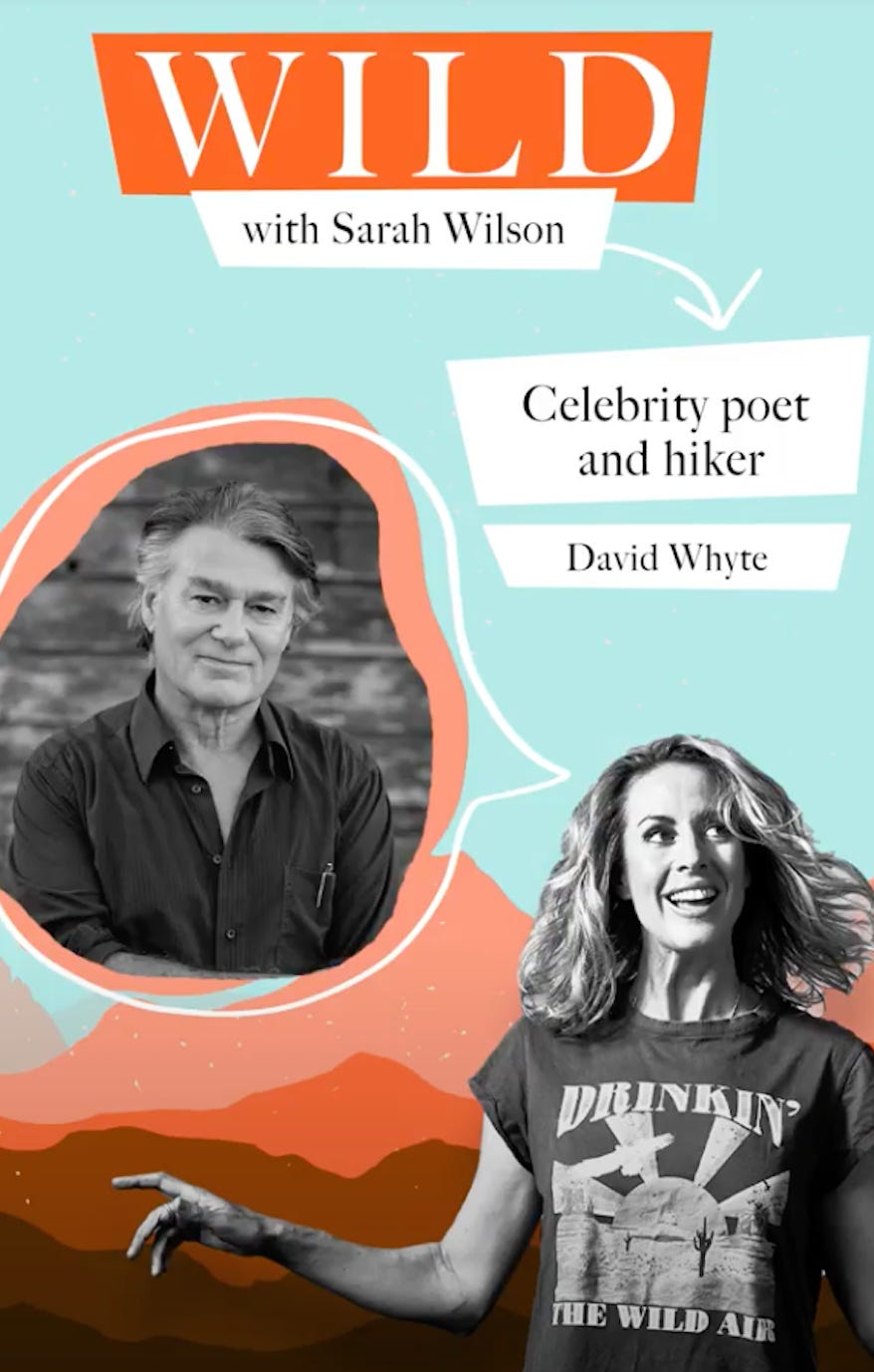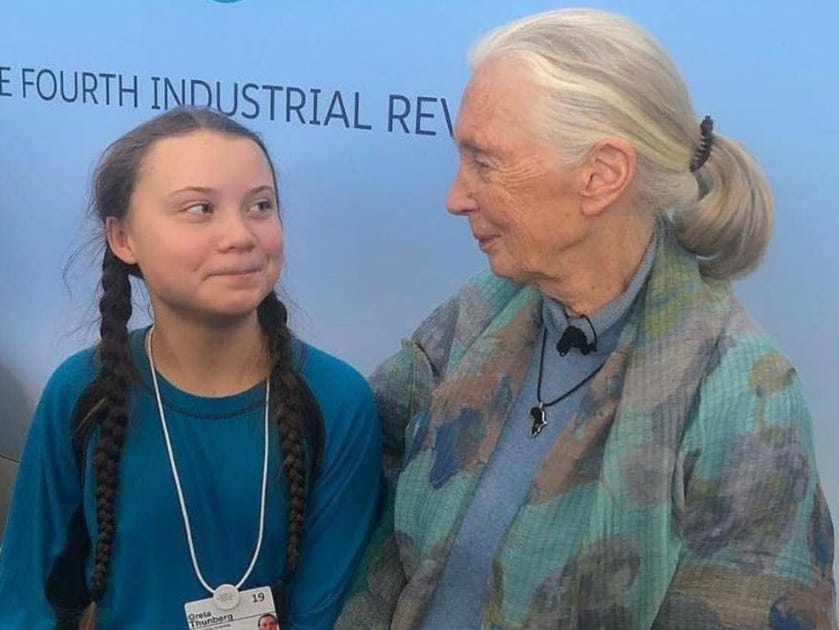In my weekly podcast Wild I often (‘tho not always) ask guests the question that I pose at the end of This One Wild and Precious Life.
“What is left if we lose it all?”
It’s a question I think more of us are starting to ask as we appreciate that we could indeed lose it all. By “all” I mean the life we love on this planet.
It’s a question that, in the constant confronting of it over the past five years or so, has led me to live the richest life I could imagine. No hyperbole here; I’m constantly startled by where I’ve arrived, and how. Confronting and answering the question for myself has helped me arrive at my peace and meaning. I guess the sense of urgency has produced a vigilant commitment to what matters. Distractions, toxic people, the run-up pursuits that anticipate (and delay) the “real thing”, indulgences, addictions…they are intolerable when the context is presented so starkly.
Pondering the question could be described as an exercise in absurdism. As we confront death our frightened, desperate grip on life, our consumption and our petty obsessions and vanity are rendered crudely meaningless and, yes, absurd. And we are funnelled almost forcibly to a far more true way of living.
At least this is how it has rolled for me.
As abursdism’s pin-up boy Albert Camus wrote in an equally existential era (the grim aftermath of WWll), awareness and acceptance of the absurdity of life can get us wild and prioritising love and other virtues. It mainlines us. It can get us to choose values such as decency and solidarity as a way of being. For, in the absence of external, permanent meaning, we are invited to become super awake and wild and create our own meaning!
Camus explores this in his book The Plague, which I re-read peak-pandemic. As he wrote, “in a time of plague, we learn that there are far more things to admire in people than to despise”. The peripheral bullshit drops away and we see humanity clearly. And it is indeed beautiful, if not admirable.
This week’s Wild guest, the poet and philosopher David Whyte, provides the most beautiful answer to the question in the series so far. You can find it at 57:42 on the interview if you want to go straight to it. He speaks to the idea that we have to die in order to live…and reads a poem to explain more fully. My producer Cassie and I cried at this point in our chat.
Some of you might recall. David is the poet who introduced me to the idea of asking “beautiful questions” as a practice for life.
And my answer to the question?
I draw on the writing of another absurdist Erich Fromm. Fromm wrote extensively on freedom during the same period of despair as Camus, mostly in response to the impending threat of nuclear war. He worried deeply about our collective asleepness and disconnection ahead of our looming demise.
His antidote was to:
“Live life as a study in love and work.”
I borrow this line to answer the question and it’s how I now live my life. Engaging curiously in both keeps me feeling there is worth, wonder and beauty in being a human in 2021. It cuts to what matters. It sidesteps the “hyperobject” that is the sadness and grief of our finiteness (a hyperobject is a term my earlier guest Timothy Morton coined to describe issues so large we can’t remove ourselves from them to observe and consider them with any wisdom or calm). But at the same time it also ensure I am actively contributing, that I’m living my allowed 85-odd year in “active solidarity”, as Fromm describes the nobel pursuit of moral togetherness in a world suffering moral loneliness.
What’s your answer if I were to ask you the question, “What is left if we lose it all?” Do you find the asking of the question frightening, too-challenging… or enlivening? I’m dedicating this edition of my newsletter to a flirtation with the topic. I’m testing the waters for this kind of philosophical conversation. IMO, I feel it is crucial right now. Even if it’s not immediately the easiest conversation or enquiry…it does become the most nourishing and peace-providing!
A David Whyte poem grab
from his poem Sweet Darkness
“Sometimes it takes darkness and the sweet confinement of your aloneness to learn anything or anyone that does not bring you alive is too small for you.”
― David Whyte
An expedient and suitably (and brutally) true wisdom for the sense of urgency you might feel.
You can listen to David read it here.
Finding peace in life after humans
…put to a haunting animation
Dutch filmmaker Arjan Brentjes created this delicate depiction of what life on Earth could become when humans become extinct. His aim, however, was not to sound (yet another) alarm on climate collapse, but to provide an “extreme form of consolation”.
(It’s worth knowing, BTW, that he created it prior to Covid-19.)
I found the clip stunning and haunting. I, too, work to this extreme consolation, namely, that (cap L) Life will, most simply and beautifully, go on. I find extraordinary comfort in this, a comfort that is more expansive and satisfying than any sense of personal safety or certainty I might seek.
I was saying to my Dad over the phone the other day that I’m somewhat at peace with the idea that humans might wipe themselves out. It makes sense. How could such excess and greed and the consuming the resources of five planet Earths every year not result in a “running out of” and a “ruination of”? I’m not saying we deserve our fate. I’m saying it could not be any other way.
You see, I trust and rest in the Flow of Life, the energetic force that saw us emerge from ameba to these complex, loving, heaving upright-walking entities, that produces fern fronds and sunsets and moon rises. I love this force, which I call (cap L) Life (some might call it God). I love It way more than I love myself or even humanity. And I’d be unfathomly bummed if It suddenly behaved inconsistently and gave humans a leave pass from their abominable and disrespectful behaviour, if It didn’t honour the balance and pursuit of Love that it works to.
I mean, what would it all be for if It did?
What would Jane Goodall answer?
survivor trees! hell yeah!
And as a final contribution, this week a reporter for Lithub asked Jane Goodall a similar take on the “what is left…” question. Goodall has a book just out called The Book of Hope. Her answer was “survivor trees”, the trees that manage to live following horrible mass destruction by humans, such as 911 or the dropping of an atomic bomb on Nagasaki. Amid the rubble (in both the aforementioned cases) a charred, vestige of an ancient tree was found (a mere branch or root surviving the carnage) and was then “nursed” back to life. These survivor trees go on to blossom.
Goodall said survivor trees provided her with hope. I guess it’s a hope that lies in nature surviving as it’s meant to. There is still hope for humanity in such an idea…we will survive (even blossom and thrive) if we behave as we’re meant to and join Life’s flow. I mean, Life will always win out.
This is our consolation, friends: if we join Life again, we will survive, ney thrive.
Finally, a small invitation to share this with friends (button above) and to subscribe if it suits (button below).
Shall we keep this radical adaption and extreme consolation conversation going?
Lemme know,
Sarah xx






I do feel (and hope) that nature is more resilient than we give it credit for… it’s going to have to be to face what’s coming. The part about realising there is more to admire in people than despise? I truly and honestly struggle with that… Maybe that’s a reflection of me. Maybe it’s the bubble I am in right now, and I as I change, so too will this. But I despair a little each day at the failure of humanity…remembering that (L)ife is in us, too? That’s hope. Beautiful clip, by the way.
Sarah, the video and the survivor trees reminds me of the Chernobyl Exclusion Zone. While humans are still not allowed to enter the zone due to the radioactivity, it is nonetheless thriving with life - flora and fauna is abundant and the area has some of the highest biodiversity and in all of Ukraine, despite the radiation. I find the climate crisis overwhelming, debilitating and truly sad. However, for some time, I have taken comfort from the idea that the Earth, Life, Mother Nature will go on. Humans may become extinct and the planet will not be what it is today, but for our Earth, time is measured in eons and humans are merely a blip. She will continue to exist in some form or another, whether we are here to witness it or not. That's not to say it will not be devastating and unfathomable and infuriating to see millions die, climate refugees fleeing, the GBR disappearing and everything else. But Nature will win in the end. Life will evolve. I love your conversations. They express all the things.